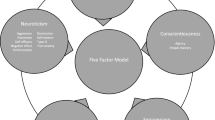Abstract
Background
Quality of Life (QoL) is an important outcome measure in oncology. QoL is influenced by personality traits, such as anxiety. To assess the influence of personality on QoL in women with breast cancer, a longitudinal prospective cohort study was done.
Methods
Ninety-one patients with breast cancer and 111 patients with benign diagnoses completed prior to the diagnosis and 1, 3, and 6 months after diagnosis and treatment a set of questionnaires.
Results
Overall QoL showed no significant differences between the two groups. The influence of trait anxiety was considerable for all measurement moments. Trait anxiety is accountable for up to 40.6% of the variance in QoL scores. Forty-five women in the benign group scored high on trait anxiety, and 40 women in the breast cancer group. Women with a high trait anxiety score were 3 times as likely to have a low general QoL six months after diagnosis and possible surgery, irrespective of the diagnosis (breast cancer or benign problems). When the women were divided into four groups based on the diagnosis and the score on trait anxiety, there was a significant difference in scores on general QoL between the groups on all measurement moments, with a significant lower score for the two groups with a high score on trait anxiety (P < 0.001).
Conclusion
Trait anxiety rather than the diagnosis breast cancer determined whether patients experienced a low QoL.


Similar content being viewed by others
References
Visser O, Coebergh JWW, van Dijck JAAM, Seisling S. Incidence of cancer in the Netherlands 1998. Tenth report of the Netherlands Cancer Registry. Utrecht: Vereniging van Integrale Kankercentra, 2001
Greenler RT, Murray T, Bolden S, Wingo PA. Cancer statistics 2000. CA Cancer J Clin 2000; 50:7–33
WHOQOL group. Development of the WHOQOL: rationale and current status. Int J Ment Health 1994; 23:24–56
Schimmack U, Radhakrishnan P, Oishi S, Dzokoto V, Ahadi S. Culture, personality, and subjective well-being: integrating process models of life satisfaction. J Pers Soc Psychol 2002; 82(4):582–593
Diener E, Oishi S, Lucas RE. Personality, culture, and subjective well-being: emotional and cognitive evaluations of life. Annu Rev Psychol 2003; 54:403–425
Ramanaiah NV, Detwiler FR, Byravan A. Life satisfaction and the five-factor model of personality. Psychol Rep 1997; 80(3 pt 2):1208–1210
Costa PT, McCrae RR. Influence of extraversion and neuroticism on subjective well-being: happy and unhappy people. J Pers Soc Psychol 1980; 38:668–678
Stark D, Kiely M, Smith A, Velikova G, House A, Selby P. Anxiety disorders in cancer patients: their nature, associations, and relation to quality of life. J Clin Oncol 2002; 20(14):3137–3146
Costa PT Jr, McCrae RR. NEO-PI/FFI manual supplement. Odessa, FL: Psychologica Assessment Recources, 1989
Hoekstra HA, Ormel J, de Fruyt F. Handleiding bij de NEO Persoonlijkheids vragenlijsten NEO-PI-R, NEO-FFI [manual for the NEO Personality Inventories NEO-PI-R and NEO-FFI]. Lisse, the Netherlands: Swet&Zeitlinger B.V., 1996
Costa PT Jr, McCrae RR. NEO-PI-R: professional manual. Odessa, FL: Psychological Assessment Resources, 1992
Spielberger CD, Gorsuch RL, Lushene RE. The State-trait anxiety inventory manual. Palo Alto, CA: Consulting Psychologists Press, 1970
van der Ploeg HM, Defares PB, Spielberger CD. ZBV. A Dutch-language adaptation of the Spielberger State-Trait: Anxiety Inventory. Lisse, The Netherlands, Swets& Zeitlinger, 1980
Spielberger CD, Gorsuch RL, Lushene RE. State-Trait Anxiety Inventory. Preliminary test manual for form X. Tallahassee, Florida: Florida State University, 1968
WHO Group. Development of the WHOQOL: rationale and current status. Int J Ment Health 1994; 23:24–56
De Vries J, Van Heck GL. De Nederlandse versie van de WHOQOL-100 [The Dutch version of the WHOQOL-100]. Tilburg, The Netherlands: Tilburg University 1995
The WHOQOL Group. The World Health Organization Quality of Life Assessment (WHOQOL): development and general psychometric properties. Soc Sci Med 1998; 46(12):1569–1585
Bonomi AE, Patrick DL, Bushnell DM, Martin M. Validation of the United States’ version of the World Health Organization quality of life (WHOQOL) instrument. J Clin Epidemiol 2000; 53:1–12
Woods M, Williams L. Cancer care. Part 1. Mental health care for women with breast cancer. Nurs Times 2002; 98(32): 34–35
Gilbert F, Cordiner C, Affleck I, Hood D, Mathieson D, Walker L. Breast screening: the psychological sequelae of false-positive recall in women with and without a family history of breast cancer. Eur J Cancer 1998; 34: 2010–2014
Lampic C, Thurfjell E, Bergh J, Sjödén P-O. Short- and long-term anxiety and depression in women recalled after breast cancer screening. Eur J Cancer 2001; 37: 463–469
van der Steeg AFW, De Vries J, Roukema JA. Quality of life and health status in breast carcinoma. Eur J Surg Oncol 2004; 30(10):1051–1057
Andrykowski MA, Curran SL, Studts JL, et al. Psychological adjustment and quality of life in women with breast cancer and benign breast problems: a controlled comparison. J Clin Epidemiol 1996; 49(8):827–834
Larsen RJ, Buss DM. Emotion and personality. In: Personality Psychology. New York: McGraw-Hill, 2005; 406–444
McCrae RR, John OP. An introduction to the five-factor-model and its applications. J Pers 1992; 60(2):175–215
Schreier AM, Williams SA. Anxiety and Quality of Life of women who receive radiation or chemotherapy for breast cancer. Oncol Nurs Forum 2004; 31(1):127–130
Acknowledgments
The authors thank Manon Schriek and Dorien Claveaux, specialized mamma-care nurses in the St Elisabeth Hospital, and Desiree Schreurs, specialized mamma-care nurse in the Maasland Hospital, for their assistance in the patient accrual.
Author information
Authors and Affiliations
Corresponding author
Rights and permissions
About this article
Cite this article
van der Steeg, A.F.W., De Vries, J., van der Ent, F.W.C. et al. Personality Predicts Quality of Life Six Months after the Diagnosis and Treatment of Breast Disease. Ann Surg Oncol 14, 678–685 (2007). https://doi.org/10.1245/s10434-006-9175-9
Received:
Revised:
Accepted:
Published:
Issue Date:
DOI: https://doi.org/10.1245/s10434-006-9175-9




